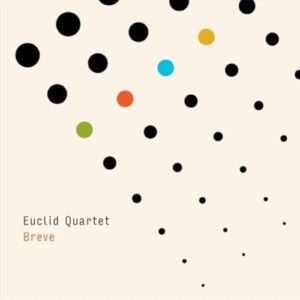Breve
Euclid Quartet
Afinat
The Breve Quartet has been in residence at Indiana University South Bend for sixteen years. During that time they have recorded a wide range of repertoire. Like so many ensembles, their catalog was put on ice during the pandemic, and their latest since 2017 for Afinat, Breve, returns with eleven miniatures in disparate styles. Listeners are encouraged to shuffle them to hear in any order.
Miniatures are often thought of as the fare of encores, but a full program of them suggests that small doesn’t mean insubstantial or merely flashy. Wolfgang Amadeus Mozart’s C-minor Adagio and Fugue is a case in point, with rigorously constructed counterpoint that reminds us of his possession of a copy of J.S. Bach’s Well-Tempered Clavier.
Another standout is Graceful Ghost Rag, a transcription of one of William Bolcom’s well-known piano rags that the quartet plays jauntily. In a similar pocket is their graceful rendition of George Gershwin’s Lullaby. Shostakovich’s Polka, From the Golden Age is a mischievous sendup of the popular dance, with deliberate “wrong notes” and pizzicatos and glissandos lampooning the saccharine lushness of bourgeois culture. One could imagine all of them appearing as part of an updated soundtrack for a film of the silent era.
Quartettsatz by Franz Schubert features an uplifting theme offset by transitions rife with portentous diminished harmonies. Hugo Wolf’s Italian Serenade takes an archetypal form and adorns it with his characteristic chromaticism. Although he is best known as a member of the Second Viennese School of early 12-tone composers, Anton Webern’s Langsamer Satz is a reminder that he also wrote attractive tonal works. Christantemi is full of the plangent melodies one also hears in Giacomo Puccini’s operas.
Metro Chabacano by Javier Álvarez recreates a ride on the Mexico City train line with repeated chords for chugging and zooming melodies that depict the rush of commuter travel. Four, For Tango written by the composer and master bandoneonist Dino Saluzzi, mixes the dance’s characteristic rhythmic patterns with open-string chords and altissimo upward slides. If you are listening straight through, Hector Villa-Lobos’ La Oración del Torero closes the disc with another dose of traditional Latinx rhythms and modal tunes, interspersed with recitative-like melodic passages.
The Euclid Quartet performs in all of the afore-mentioned, stylisitically disparate pieces with both technical and interpretive assuredness. Sometimes less is more, as evidenced by Breve.
-Christian Carey

